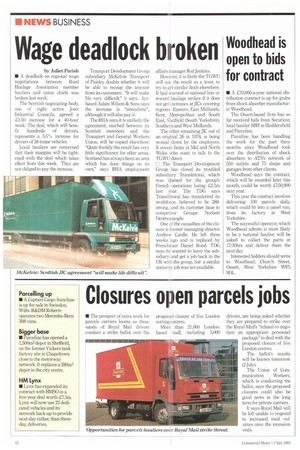Wage deadlock broken
Page 14

If you've noticed an error in this article please click here to report it so we can fix it.
by Juliet Parish • A deadlock on regional wage negotiations between Road Haulage Association member hauliers and union chiefs was broken last week.
The Scottish negotiating body, one of eight active Joint Industrial Councils, agreed a £ 5.50 increase for a 40-hour week. The deal, which will benefit hundreds of drivers, represents a 3.5% increase for drivers of 38-tonne vehicles.
Local hauliers are concerned that their margins will be tightened with the deal which takes effect from this week. They are not obliged to pay the increase. Transport Development Group subsidiary McKelvie Transport of Paisley doubts whether it will be able to recoup the amount from its customers: "It will make life very difficult," it says. Ayrbased Adam Wilson & Sons says the increase is "unrealistic", although it will also pay it.
The RHA says it is unlikely the agreement, reached between its Scottish members and the Transport and General Workers Union, will be copied elsewhere: "Quite frankly the result has very little significance for other areas. Scotland has always been an area which has done things on its own," says RHA employment affairs manager Rod Jenkins.
However, it is likely the TGWU will use the result as a lever, to try to get similar deals elsewhere. It had warned of national hire or reward haulage strikes if it does not get increases at JICs covering regions Eastern, East Midlands, Kent, Metropolitan and South East, Sheffield (South Yorkshire), Southern and West Midlands The other remaining JIC out of an original 26 in 1976, is being wound down by the employers. It covers firms in Mid and North Wales who want to talk to the TGWU direct.
The Transport Development Group has closed its troubled subsidiary Translittoral, which was blamed for the group's French operations losing £2.1m last year. The TDG says Translittoral has transferred its workforce, believed to be 288strong, and its customer base to competitor Groupe Norbert Dentressangle.
One of the casualties of the closure is former managing director Andrew Cardle. He left three weeks ago and is replaced by Frenchman Daniel Rond. TDG says he wanted to leave the subsidiary and get a job back in the UK with the group, but a similar seniority job was not available.












































































